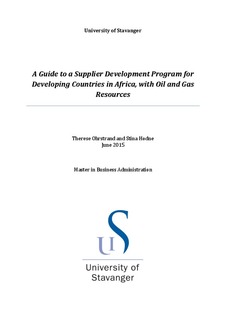| dc.description.abstract | In this thesis, we will create a guide to a supplier development program (SDP) for developing countries in Africa with oil and gas resources, and look at various participants’ incentives and contributions. Many African developing countries have natural resources that they don’t have enough knowledge or skills to develop, and some of these resources are oil and gas. International oil companies (IOCs) want to expand their business and start producing in these developing countries, while the developing countries want the oil companies´ help to develop their local businesses. In order to achieve this, they have implemented local content requirements to ensure that foreign companies will use local labour and products in their operation. These requirements can lead to various benefits for the host country, such as economic growth and new workplaces, but it also has its challenges. IOCs have requirements that their suppliers will have to meet in order to get on an approved vendor list, and as it is today, few or none of the local suppliers manages to fulfil these requirements. To bridge this gap they need training, and one type of training is a supplier development program. Our guide to a SDP is based on a collaboration between local government, IOCs, local suppliers, learning institutions, and aid organizations. This thesis is a theoretical conceptual study, and our SDP is a generic guide, which needs to be adjusted in each case based on the defined gap that exists between local suppliers and IOCs, and the differences between the various countries. Our SDP focuses on scope, duration, number of suppliers and participants from each supplier, expenses and necessary equipment, theoretical versus practical training, tests and checks during the program, and owners, teachers, and location. We truly believe that there should be an increased awareness around how developed countries can contribute to help developing countries reach their full potential, and it is our opinion that this guide to supplier development program can participate with this, and ensure a win-win situation for all involved parties. | nb_NO |

